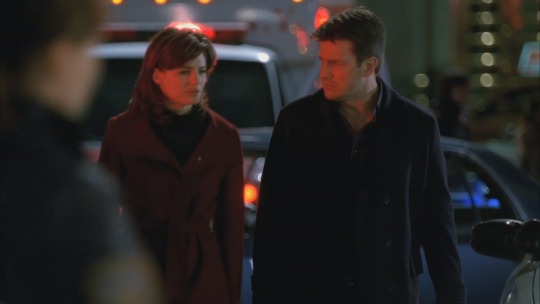#Roy MontgomeryFic
Text

Title: Nautilus
WC: 850
“It’s probably no big deal.”
—Kate Beckett, Love Me Dead (2 x 09)
His daughter is a nice kid. That doesn’t surprise her any more—not the way it did when she first met him. She’s nice. She has a good head on her shoulders. She’s earnest and a mixture of self-reliant in some ways an a little immature in others. It makes sense, she supposes, given him and, she has to admit, especially given the girl’s mother. She’s had to do for herself in a host of ways and, given Castle’s overprotective tendencies, she hasn't been asked or maybe even allowed to do for herself in others. And she’s attached to him, obviously and unsurprisingly. The two of them are attached to each other, and she has to hand it to him. He’s raised a nice kid.
. . . who knows an awful lot about her.
She’s trying not to be weirded out by it—the confident opening after the almost comically formal Thank you for taking the time to meet with me Detective. She is reasonably sure she managed at least not looking weirded out by the the sudden declaration: I understand you did a semester abroad, and I know Paris isn’t Kiev, but . . .
It’s an absurd thing to be weirded out by. Of course he knows she studied abroad, despite the fact that she has never told him any such thing. But she’d categorically refused to elaborate on her Russian gangster’s moll persona after their adventure in Chinatown. Of course, he would have wheedled as many details as possible out of Ryan and Esposito immediately after said adventure. She understands that’s how he works. He develops infuriatingly good hunches and displays equally infuriating skill in following them.
What she doesn’t understand is how any of this translates into dinner table conversation that someone as wildly overprotective as he is would consider suitable for his teenage kid’s tender ears. Because she knows he's not sharing tales of himself about to die of a self-inflicted Russian mobster wound. And she has to believe that he’s not regaling his daughter with her adventures in pantslessness. So how do the dry details of her college career even come up? More to the point: Why does he even care?
That may actually be the question. Why does he care? What does he care about?
He’s a writer. She gets that, sort of. She has a vague sense and the memory of the murderboard in the Bat Cave to tell her that—loath as she is to admit it—there is some work involved in what he does. He’s not exactly Michelangelo chipping away all the bits that are not Nikki Heat, but the Nikki that ends up on the page does emerge out of backstory, some of which he’s left on the cutting room floor, to mix a metaphor.
So he lives his life dreaming up ways to provoke her not just into externalizing her thought processes—which, by the way, have always worked just fine as internal thought processes—but into sharing about her mother, into coughing up details about the secrets she kept from her dad when she was his daughter’s age.
It’s on that last point that he loses her. Or she gets lost there, at least, because how can that possibly matter? What deftly shaded nuance can her adolescent secrets possibly impart to Nikki Heat?
Contemplating all this may be what’s actually weirding her out.
Things with him are like the very start of the yellow brick road. When the powers that be conspired against her and she took those first resentful steps on to that path, everything was well within sight. His motives seemed as clear as they were clichéd—he was dead set on a conquest and while he was pressing every single one of her buttons, as well as a few he had installed himself, he’d shake her down for details for a book he might or might not ever write.
She has, since then, moved further along that road, the two of them spiraling out together. She has come to accept that he is invested in the work. Even though his dogged interference on that first case might have been boredom or morbid curiosity or a thinly veiled excuse to pursue her, she knows that their rift last spring—his banishment—wounded him in ways that go well beyond the clichéd. She’s come to accept that the thoughts he coaxes out of her as they work a case are a net positive—that the ways they challenge each other’s thinking are a recipe for success and he’s proud of that. He values it.
But he talks to his daughter about her college days. He might well want to know all the secrets that she kept from her dad, even if they’re boring, innocent, teenage things that simply looked silly in the light of day. He might be invested in more than the work and that’s a possibility that she didn’t see coming when they stepped out on to this wide spiral arm of the yellow brick road they’re on.
She’s trying hard not to be weirded out by that.
A/N: The dreadmill lives. Brain Poneh cannot let go of the issue of conduits of information here. It's hard not to picture Beckett squirming, at this stage of the game, to think she's a topic of dinner table conversation.
#Castle#Caskett#CastleABC#Castle: Season 2#Castle: Love Me Dead#Castle: 2 x 09#Kate Beckett#Richard Castle#Alexis Castle#Martha Rodgers#Lanie Parish#Johanna Beckett#Javier Esposito#Jim Beckett#Kevin Ryan#Roy MontgomeryFic#Fanfic#Fanfiction#Fan Fic#Fan Fiction#Writing#Fabrications
18 notes
·
View notes